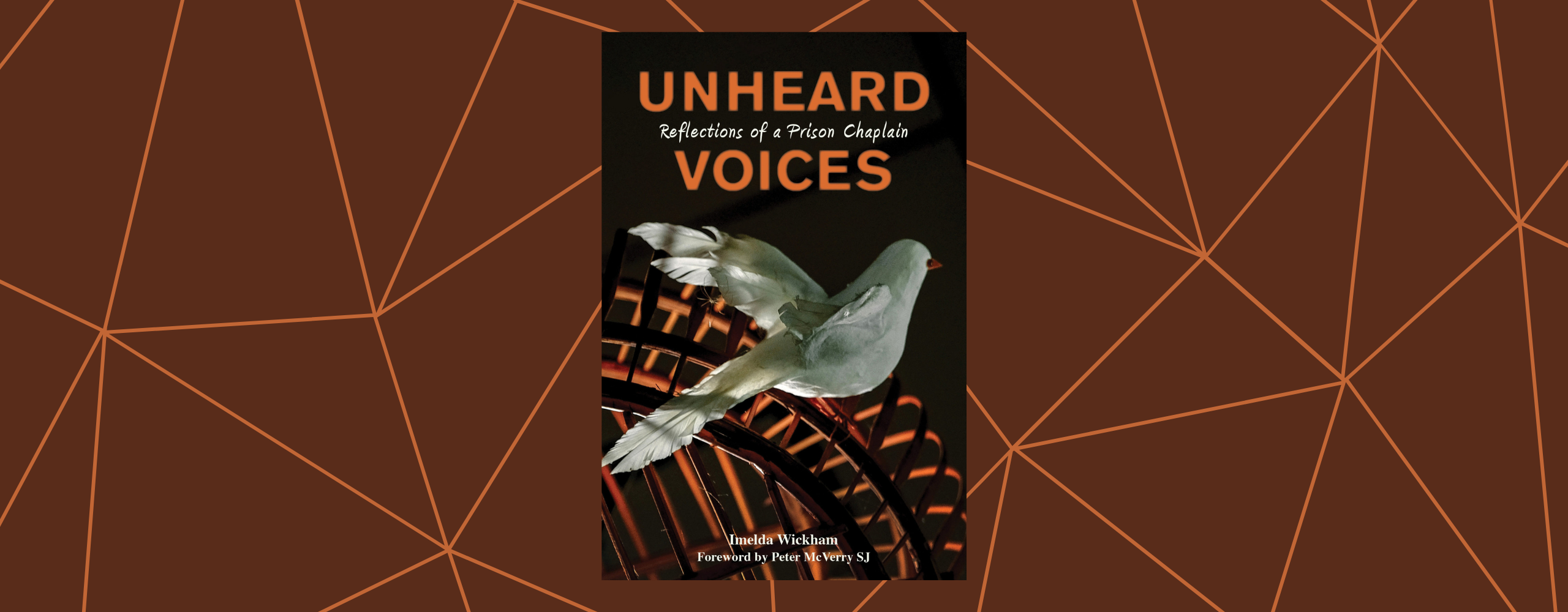
Imelda Wickham is a Presentation Sister whose work is currently based in Clondalkin, west Dublin. Since the 1990s, she has been a significant presence in the life of prisoners in Ireland through her chaplaincy work. Although she is now retired, she retains an active role in the post-release service, TRAIL. Unheard Voices: Reflections of a Prison Chaplain honours a promise she made almost a decade ago to her friend, Sr Imelda Carew to write her reflections on her ministry.
Reflections on the human cost of imprisonment
The book comprises of two sections. Its second half is made up of short, accessible reflections which are artfully written, which cut straight to the human level, the reality of what imprisonment does to people. The heartbreak of the heavily pregnant woman deprived of a last proper visit with her partner because a sniffer dog makes an incorrect response to her in the screening area. The torturous grief of a young man who is prevented from attending the funeral of a cousin who was raised as his sister, because legally she is not a sibling. The parents who feel like they endure death as the prosecution of their son unfolds in the courtroom below them. The habitual criminal who late in life comes to terms – while in prison – with the serious abuse inflicted upon him.
Chaplains are called to be present
The first half of the book is more analytical, introducing the reader to Sr Wickham’s personal journey and how she has navigated – and been changed by – prison chaplaincy. The opening section makes a provocative but coherent comparison between entering a religious order and crossing the threshold of a prison. She is happy in her vocation and does not equate the situations. But examining how both involve an individual conforming to a long-standing institution is a useful device through which she invites us to empathise with the prisoner. The limitations and challenges of life in a religious order are freely chosen, but the restrictions on the life of prisoners are imposed.
There is a profound old theology book from Japan called “The Three Mile Per Hour God”, which reflects on what it means that Jesus walked everywhere. He was not concerned with the shortest route. He moved at a pace slow enough to accompany the troubled and the weary.
I was reminded of it by Unheard Voices. Throughout this book, there is a profound but easily missed recognition that while the wider world – and all too often the church as well – looks constantly for progress and growth and impact, the Christian vocation calls us to something deeper. The chaplain is primarily committed to presence.
Wickham jokes that her days began on the main corridor of the prison, as all the men were released at once. “It was a bit like the M50 but maybe not as slow” (p. 15). She goes on to reflect that over the decades she walked thousands of miles up and down the corridors of Mountjoy prison. “I walked the walk … and got nowhere, just ending up where I began all the time. Wherever the Spirit led me I went” (p. 15). This is not a vision for a purpose-driven ministry. There is not a trace of paternalism in the book. Rather, there is a keen eye for the way that the society established within a prison is meaningful in itself and the prisoner’s greatest aid often comes – of course not always – from their fellow prisoner.
The view of chaplaincy presented in this book is threefold. The chaplain is called to stand prophetically for justice, to be an advocate for those imprisoned, and to “promote the principles and practices of restorative justice” (p. 23). It is fair to say that even though there are a few initiatives here and there, restorative justice is not at the top of the list of priorities for the Irish criminal justice system.
Prison is not working
Perhaps the most depressing section of the book is where Sr Wickham tells the stories of men who committed crimes “in order to get back in” (p. 29). Having been so ravaged by their life experience, enduring wider society was harder than incarceration. There are many things to reflect on in that phenomenon, but above all others is the clear fact that if this is how prison functions, prison isn’t working.
While being accessible, funny, and pastoral, the impressive aspect of this book is that it represents a clear call for the beginning of something like a prison abolitionist movement in Ireland.
Early in the book, I read the sentence that has stayed with me longest:
“Is it not time for some prison walls to come down and for society to have the courage and foresight to explore other options to address the issues of crime and punishment?” (p. 13)
We can’t tear down every prison wall. But we can ask probing, honest questions about the system we have in place, make appropriate verdicts on whether they achieve what we hope they will achieve, and exploring alternatives if it is found that they do not.
Unheard Voices: Reflections of a Prison Chaplain by Sr Imelda Wickham is available to purchase from Messenger Publications and in bookshops nationwide.

